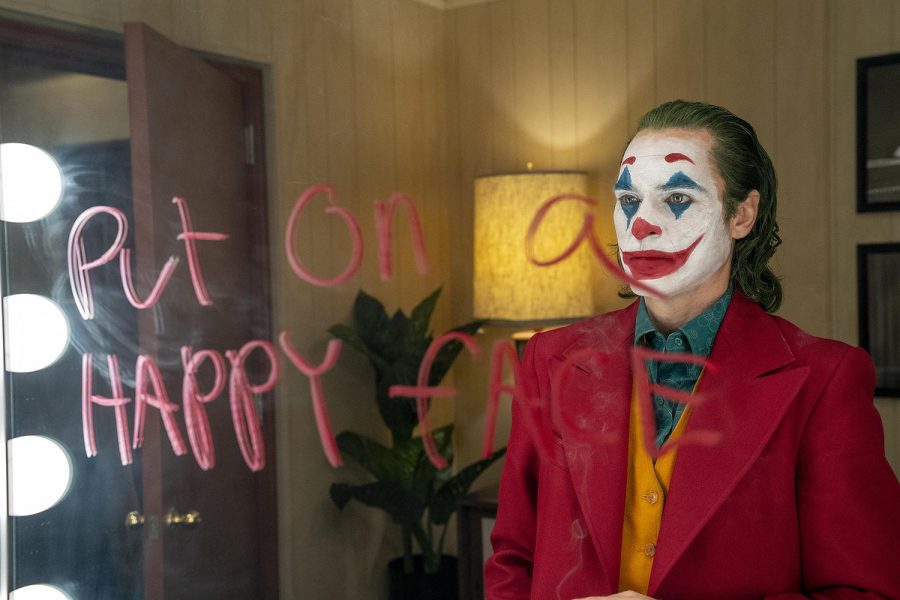Opinion: Joker critics promised chaos, but the violence stays on screen
The film explores mental health and societal stigmas, all of which were overlooked by those who predicted malice.
Joaquin Phoenix stars in "Joker." [Handout photo by Niko Tavernise/Warner Bros. Pictures]
October 8, 2019
I walked into the sold-out showing of Joker with a unique combination of movie-geek excitement, media-instilled nerves, and slightly stale Gobstoppers. I left with an overwhelming and shockingly profound appreciation and admiration for a cinematically exquisite piece of art.
It was then that I turned my attention back to the news.
Even before critics attended the first screenings, media figures were condemning Warner Bros. for bringing to life such a dark, violent, and nihilistic film, especially in a time when mass shootings are more prevalent than ever — with an Aurora, Colo., theater abstaining to show the movie — and political unrest looming in every headline.
The presumption is that Joker could potentially serve as a catalyst (much like what one may claim with violent video games) for someone who is already experiencing negative thoughts similar to that of protagonist Arthur Fleck. He slowly evolves into the Joker by product of what happens to him, and the film appears to justify the murderous acts of a clown gone rogue.
After having seen the film, however, it’s evident that the media are the ones who have ignored the bigger picture.
A New York Times Magazine piece by Dan Brooks made light of everyone being worried about the effects of the film on “involuntarily celibate young men” and “sexless losers.” He then goes further to negatively marginalize the people who enjoy comic books. “This fear of other people’s bad taste, of losing movies to a supermajority of grown men in Deadpool shirts, seems to be the terror that Joker most successfully evokes.”
These words from such a prominent journalistic platform fuel the very world director Todd Phillips created, throwing people under the bus simply for who they are. Critics such as Brooks then go on to plant an idea that, for me, didn’t even exist before he told me that I was supposed to be terrified of particular moviegoers.
The resulting hysteria focuses on the right to bear arms and the “sad sack” that would commit such a crime instead of what poignantly exists within the deeper layers of the film: mental illness, bullying, and a world that turns a blind eye to such inconveniences.
Ironically, Brooks and other journalists sound eerily similar to Thomas Wayne (Bruce Wayne’s father) who condemns Joker’s existence as cowardice and pathetic. The actions committed by Joker are horrific, alarming, and unforgivable — period.
But why are we completely ignoring the first three-quarters of the movie? And why are the media exacerbating people’s fears?
Joker isn’t serving as the vehicle for madness no more than Do The Right Thing was the reason for uproar on race tensions. Cinema is a portal into worlds we would otherwise never see, experiences we will fail to have, and lives we couldn’t even imagine existing without the big screen. By replacing a vat of chemicals with a realistic past of abuse, isolation, and a cruel culture, Joker is giving us a chance to check in on our loved ones, question societal systems, and to assess just how we treat our Earth’s inhabitants.
Yes, the film is haunting. It’s hard to watch at times, but that’s not what troubles me. What lingers long after Joaquin Phoenix commits to green hair and a chaotically evil lifestyle is that no one is listening. No one seems to be stopping and digesting the signs and conditions that led to its explosive final stretch.
Phillips isn’t exploiting a world that is on the brink. He is giving us a chance to fix what humanity has broken, to look beyond the surface of a mask. Yet, all anyone is talking about is how Joker will tear our society apart.
The media have made a villain of a villain’s story, but the true antagonist is an apathetic culture who demonizes anyone who fails to walk society’s narrow path.
Columns reflect the opinions of the authors and are not necessarily those of the Editorial Board, The Daily Iowan, or other organizations in which the author may be involved.




















